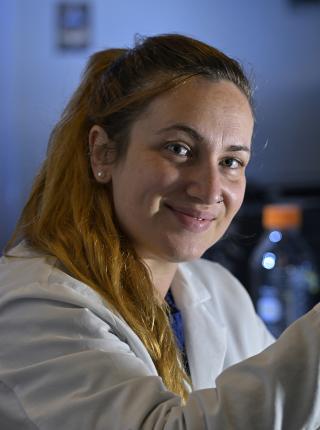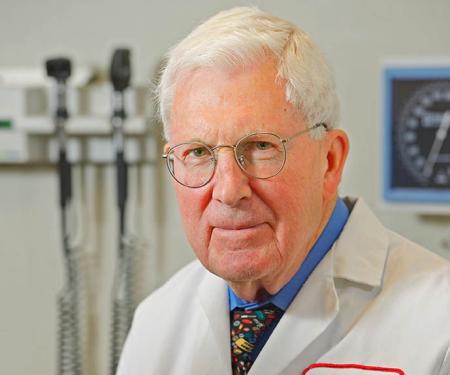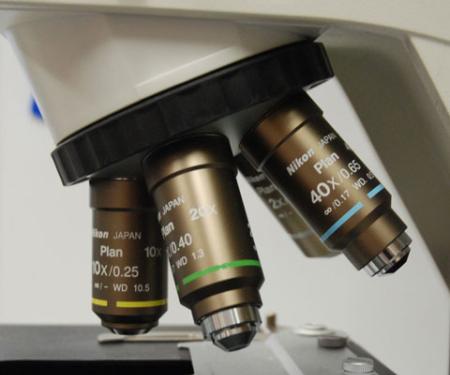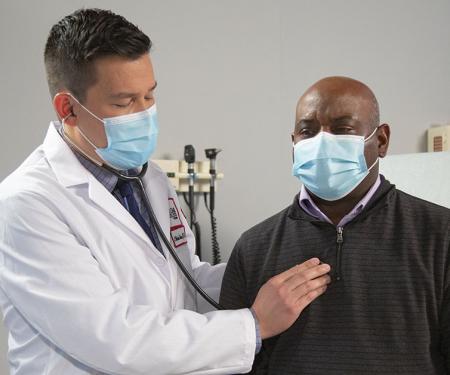This Fox Chase professor participates in the Undergraduate Summer Research Fellowship.
Learn more about Research Volunteering.
Related Articles
00 / 00

This Fox Chase professor participates in the Undergraduate Summer Research Fellowship.
Learn more about Research Volunteering.
Professor
Co-Leader, Cancer Prevention and Control Program
Samuel M.V. Hamilton Chair in Cancer Prevention
Special Advisor to the Cancer Center Director
As Special Advisor to the Cancer Center Director at Fox Chase Cancer Center, Dr. Clapper is responsible for fostering collaborations with faculty in the area of population science and identifying opportunities to enhance research interactions and funding across Fox Chase's scientific programs.
A professor and longtime faculty member at Fox Chase, Dr. Clapper also serves as co-leader of the Center's Cancer Prevention and Control Program. In 1991, she created one of the first basic research programs nationally to focus on developing strategies to reduce cancer risk among high-risk individuals and promote early detection and prevention. At the time, the idea of preventing a disease like cancer was not widely accepted. The program has since grown under her direction and has broadened its work to include prevention research focused on colorectal cancer as well as lung cancer, with a strong interest in and pursuit of translational opportunities.







This program, established more than 20 years ago, is one of the first basic research programs nationally to focus on the development of strategies for the prevention of cancer. Its overall goal is to develop novel, efficacious preventive regimens for those individuals who are at highest risk for cancer, based on predisposing genetic and environmental factors. All research is highly translational, with experimentation spanning from cultured cells and genetically-defined animal models to the analysis of human tissues and conduct of clinical trials. Innovative use of state-of-the-art genomic and image-based technologies continues to provide unique insight into the molecular basis for cancer susceptibility and inform the design of promising strategies for early tumor inhibition. As a Prime Contractor of the Division of Cancer Prevention, NCI for the past two decades, the group has evaluated the ability of numerous promising agents to inhibit tumor formation in preclinical animal models and comprehensively investigated the associated mechanisms of drug action. Specific research interests include the establishment of regimens for the prevention of colorectal cancer in high‑risk subjects with ulcerative colitis or predisposing genetic factors, the improved detection of early colorectal tumors, and the contribution of hormones to the development of lung cancer among never-smokers. In many cases, findings from preclinical efficacy and mechanistic studies have led to the conduct of biomarker trials in humans with promising cancer preventive agents. The laboratory has been funded continuously by grants from the National Cancer Institute, NIH since its initiation and has a long track record of mentoring talented physician scientists, and pre- and postdoctoral trainees.
Prevention of Heritable and Colitis-associated Colorectal Cancer. A major interest of the lab is to improve our ability to detect colorectal tumors early and establish regimens for the prevention of colorectal cancer in both subjects with known genetic risk and patients with ulcerative colitis. Scientific advances have been facilitated by the generation of genetically-engineered and chemically-induced mouse models that recapitulate the human disease. A novel strain of Apc+/Min-FCCC mice uniquely develop spontaneous colorectal tumors at a high multiplicity. This model has been used extensively to test agents for their cancer preventive activity and develop image-based probes for the detection of early neoplastic colorectal lesions. Several mouse models of colitis-associated colorectal cancer have also been established by this group. Their extensive characterization has not only confirmed their clinical relevance, but provided new insight into the pathogenesis of inflammation-associated disease progression. Analyses of the molecular mechanisms underlying colitis-associated neoplasia have led to the discovery that morphological subtypes of dysplasia arise via distinct genetic pathways and respond differently to therapeutic intervention. State-of-the-art genomic approaches are being used to elucidate the molecular events (e.g., microRNA expression) that accompany disease initiation and progression and could serve as early biomarkers of the development of colitis-associated colorectal lesions. Specific projects follow:
Preventive Regimen for Patients with Lynch Syndrome. Lynch Syndrome is one of the most common hereditary cancer syndromes, characterized by a heritable mutation in a mismatch repair gene. Mutation carriers have a high lifetime risk of developing colorectal cancer (£ 80%), with the majority diagnosed before age 50. Preclinical data generated by this group indicate that the preventive activity of agents varies depending on the point of intervention. Atorvastatin (Lipitor) dramatically decreases colorectal adenomas when administered to naïve Apc+/Min-FCCC mice before the formation of endoscopically detectable adenomas. In contrast, use of an NSAID in combination with atorvastatin is needed to reduce the multiplicity of colorectal adenomas in mice with existing tumors at treatment initiation. These promising data have been used to design a biomarker prevention trial in high-risk subjects with Lynch Syndrome that is currently in progress at Fox Chase.
Impact of Folic Acid Supplementation on Risk of Colitis-associated Colorectal Dysplasia. The fortification of foods with folic acid in the US, when combined with the routine use of supplements, has led to the intake of folic acid at unprecedented high levels. Published reports suggest that: 1) supraphysiological levels may increase the risk for colorectal cancer; and 2) delaying folic acid supplementation until after lesions are established may promote colon tumorigenesis. Patients with chronic ulcerative colitis not only have a strong underlying predisposition to colorectal cancer, but frequently require folic acid supplementation. The goal of this study is to assess the effect of varying doses of folic acid on the development of colitis-associated neoplasia and DNA methylation in the clinically relevant mouse model of carcinogen azoxymethane/dextran sulfate-sodium (DSS)-induced colitis. Preliminary findings indicate folic acid enhances colitis‑associated colorectal dysplasia and impacts DNA methylation in a dose-dependent manner.
Contribution of Estrogen to Lung Cancer Among Never Smokers. The incidence of non-small cell lung cancer (NSCLC) among those without a history of tobacco use is increasing rapidly, highlighting the critical need to better elucidate its biology and the factors contributing to its rise in recent years. The etiology of NSCLC in never-smokers remains unexplained, although the predominance of females affected by this disease has prompted an investigation of the contribution of hormones to lung tumorigenesis. This group is the first to report that: 1) the murine and human lung can extensively metabolize estrogen; 2) metabolite levels are higher in human lung tumors, as compared with adjacent normal tissue, and in women vs. men; and 3) estrogen metabolism varies with race among postmenopausal women.
Non-Small Cell Lung Cancer among Never-smokers. A multidisciplinary team of basic researchers and thoracic oncologists has been assembled to investigate the mechanism by which estrogen may promote NSCLC in never-smokers, as well as the basis for elevated levels of specific catechol metabolites in some patients. Mechanistic in vitro studies are being complimented by experimentation in genetically-engineered mouse models of EGFR- and Kras- mutated lung cancer. Findings from these studies are anticipated to greatly enhance our understanding of the manner in which estrogen metabolism is regulated in humans, as well as the mechanisms by which estrogen derivatives may damage the normal lung.
A sensitive UPLC-MS/MS assay for quantifying estrogen metabolites in biosamples has been established recently by this group. Analysis of the urinary estrogen metabolite profile of never-smoking NSCLC patients revealed significant heterogeneity, with overproduction of specific metabolites detected in a subset of patients vs. cancer-free controls. Elucidation of the regulatory mechanisms and the clinical factors that impact the activity of estrogen metabolizing enzymes will allow identification of never-smokers with detrimental profiles who may benefit from targeted therapeutic intervention. Rapid translation of preclinical findings to patients facilitated by the recent establishment of a Clinic for Never‑smokers with NSCLC, the first on the East Coast, by thoracic oncologists Drs. Joseph Treat and Nick Bodor at Fox Chase Cancer Center.
Shatalova EG, Klein-Szanto AJ, Devarajan K, Cukierman E, Clapper ML. Estrogen and cytochrome P450 1B1 contribute to both early- and late-stage head and neck carcinogenesis. Cancer Prev Res (Phila). 2011 Jan;4(1):107-15. PubMed PMID: 21205741; PubMed Central PMCID: PMC3043603. PubMed
Meireles SI, Esteves GH, Hirata R Jr, Peri S, Devarajan K, Slifker M, Mosier SL, Peng J, Vadhanam MV, Hurst HE, Neves EJ, Reis LF, Gairola CG, Gupta RC, Clapper ML. Early changes in gene expression induced by tobacco smoke: Evidence for the importance of estrogen within lung tissue. Cancer Prev Res (Phila). 2010 Jun;3(6):707-17. PubMed PMID: 20515954; PubMed Central PMCID: PMC2896420. PubMed
Hensley HH, Merkel CE, Chang WC, Devarajan K, Cooper HS, Clapper ML. Endoscopic imaging and size estimation of colorectal adenomas in the multiple intestinal neoplasia mouse. Gastrointest Endosc. 2009 Mar;69(3 Pt 2):742-9. PubMed PMID: 19251020; PubMed Central PMCID: PMC2821747. PubMed
Egleston, BL, Meireles SI, Flieder DB, and Clapper ML. Population-based trends in lung cancer incidence in women. Seminars in Oncology. 2009 36: 506-515. (Lead article in an edition devoted to lung cancer in women.) PubMed PMID: 19995642; PubMed Central PMCID: PMC2846780. PubMed
Clapper, ML, Gary MA, Coudry RA, Litwin S, Chang W-C L, Devarajan K, Lubet RA, Cooper HS. 5‑aminosalicylic acid inhibits colitis-associated colorectal dysplasias in the mouse model of azoxymethane/dextran sulfate sodium-induced colitis. Inflamm. Bowel Dis. 2008 14:1341-1347. PubMed PMID: 18452197. PubMed
Cooper HS, Chang WC, Coudry R, Gary MA, Everley L, Spittle CS, Wang H, Litwin S, Clapper ML. Generation of a unique strain of multiple intestinal neoplasia (Apc+/Min-FCCC) mice with significantly increased numbers of colorectal adenomas. Mol Carcinog. 2005 Sep;44(1):31-41. PubMed PMID: 15937958. PubMed
Hensley HH, Chang WC, Clapper ML. Detection and volume determination of colonic tumors in Min mice by magnetic resonance micro-imaging. Magn Reson Med. 2004 PubMed
The Clapper lab, a basic research cancer prevention laboratory, is seeking a motivated postdoctoral associate to perform cutting-edge cancer prevention research to identify biomarkers of cancer risk and develop efficacious interventions for the prevention of cancer. Candidates will investigate the contribution of hormone metabolism to the risk of never-smoking lung cancer and explore novel therapeutic strategies to intervene in this process. All projects are translational in focus, employing cell culture, genetically-engineered mouse models, and human tissue specimens. Eligible candidates, with solid experience in animal modeling and molecular biology, will have an opportunity to learn state-of-the-art techniques and collaborate with oncologists in the Never Smoking Lung Cancer Clinic at Fox Chase Cancer Center. Candidates will join a lab that is a Prime Contractor of the Division of Cancer Prevention, NCI and has a track record of decades of continuous NCI funding.
As one of the four original cancer centers to receive comprehensive designation from the National Cancer Institute, Fox Chase Cancer Center has been at the forefront of cancer research for almost 90 years. We are home to excellent research facilities, top clinicians and scientists, and outstanding patient care. Our singular focus on cancer, which couples discovery science with state of the art clinical care and population health, remains the foundation of our work.
The scientist training programs at Fox Chase Cancer Center provide professional development opportunities in four core areas identified as crucial for successful careers in science, research, and health care including communication, leadership, teaching, and mentorship. Upon joining the program, graduate students and postdocs develop individual development plans to help guide their growth. Training throughout the year is supplemented with free professional development opportunities, including a robust ‘How To’ series, writing courses, networking, mentorship, and teaching opportunities, a trainee-led seminar series, a trainee-led annual Research Conference, and more. Postdocs at Fox Chase Cancer Center are supported by the Temple University Postdoc Association and the Office of Academic Affairs at Fox Chase, and are compensated with competitive pay and benefits.
In addition to the robust training program, scientists at Fox Chase Cancer Center benefit from being part of the rich scientific and biotech environment in the Philadelphia region. Many of our former trainees are now employees (and contacts) at nearby institutions and companies, including The Wistar Institute, Merck, GSK, AACR, and numerous others.
Please email a CV and cover letter describing your research interest(s) and career goals to Margie Clapper, PhD at [email protected].
This Fox Chase professor participates in the Undergraduate Summer Research Fellowship.
Learn more about Research Volunteering.














